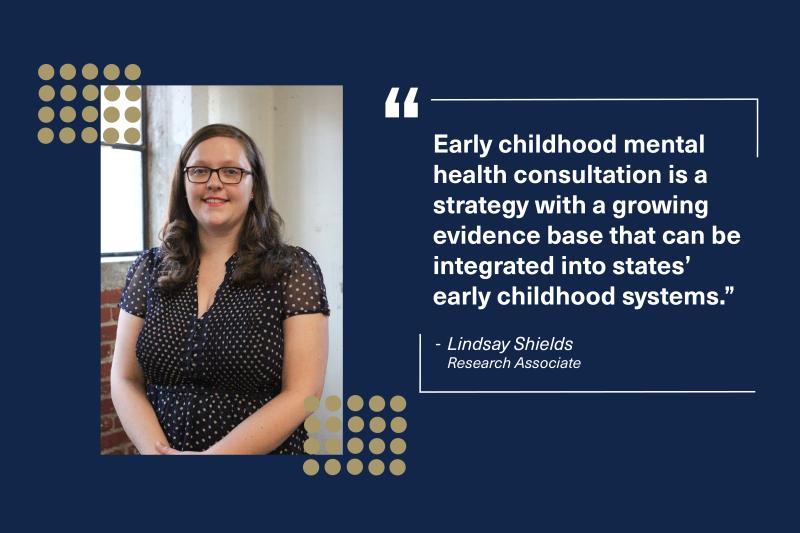Like many new early childhood teachers, when I began teaching three-year-old preschool I became overwhelmed by some of the challenges that emerged trying to support the young children in my care as they learned to regulate their emotions and interact with me and the other children in our classroom. Luckily, I had access to an early childhood mental health (ECMH) consultant and was eager for their help. I initially thought that the ECMH consultant would provide direct mental health treatment to a couple of the children in my room. It was an important shift in my understanding when I learned that my ECMH consultant was there to build my capacity to support my students’ social and emotional development. This experience is common, and it is important that more people both in and outside of early childhood education (ECE) know how ECMH consultation supports young children.
What Is Early Childhood Mental Health Consultation?
ECMH consultation is a prevention-based approach to promoting the positive social and emotional development and behavioral health of young children (Center of Excellence for Infant & Early Childhood Mental Health Consultation). Consultants indirectly support children by working with the adults in children’s lives, whether at home or in child care settings, to build their capacity to interact with children and create environments in which children’s social and emotional development is supported. In fact, ECMH consultation can occur in a wide variety of settings including child care centers, preschools, children’s own homes and within the context of home visiting programs and early intervention service delivery.
What Do the Services Early Childhood Mental Health Consultants Provide Look Like?
Across states, ECMH consultation models may differ in programmatic elements such as frequency, intensity and duration of service delivery, but broadly, the Center of Excellence for Infant & Early Childhood Mental Health Consultation identifies three types of consultation:
- Child- and family-focused consultation aims to help adults in a child’s life understand and respond to an individual infant or young child. For example, an ECMH consultant may work with families to help them develop a routine or a personalized book to help their child with the transition from home to their center in the morning.
- Classroom- and home-focused consultation aims to improve the home or classroom environment to be more supportive of the social and emotional development of children. Here, an ECMH consultant might help a teacher set up routines that help children transition into the classroom in the morning, such as the use of a greeting apron that gives children choices for how they would like to be greeted by the teacher, a feelings board to check in with how children are doing when they arrive and breathing exercises to practice at circle time.
- Programmatic consultation focuses on “program-wide impact through a focus on multiple issues that affect the overall quality of an [ECE] program or service delivery system” (Programmatic Consultation, IECMH Consultant Foundational Modules). For instance, this may involve reviewing program policies and procedures to see how they might be improved to reduce exclusionary practices such as suspensions and expulsions.
What Kind of Evaluation Work Has Butler Done Related to Early Childhood Mental Health Consultation?
ECMH consultation is a strategy with a growing evidence base that can be integrated into states’ early childhood systems. The Butler Institute for Families has a robust portfolio of projects we’ve worked on to facilitate the implementation of ECMH consultation. Most recently, Butler worked with the Colorado Evaluation Action Lab to support the development of implementation fidelity parameters for Colorado’s model for ECMH consultation and to also explore current practices in the field. This work involved developing and piloting a paired reflection tool to assist ECMH consultants’ use of the consultative stance, a core practice in ECMH consultation. Butler then administered the tool to all state-funded ECMH consultants and their supervisors across Colorado at three separate time points throughout the 2023–24 school year, analyzed the results after each administration window and developed written reports to evaluation partners and ECMHC program leaders with data-informed recommendations for how targeted professional development can meet the needs of ECMH consultants. Previously, Butler also led the Early Childhood Mental Health Consultant Workforce Training and Professional Development Environmental Scan (2021). The environmental scan captured the current state of preparation and professional development pathways for Colorado’s ECMH workforce and provided recommendations for foundational and continuing preparation, considering national standards from the Center of Excellence for Infant and Early Childhood Mental Health Consultation and feedback from state stakeholders.
Resources to Learn More
Center of Excellence for Infant & Early Childhood Mental Health Consultation. (n.d.). IECMHC Basics. https://www.iecmhc.org/iecmhc-basics/
Healthy Child Care Colorado. (n.d.). Early Childhood Mental Health Consultation. https://healthychildcareco.org/programs/early-childhood-mental-health-consultation/
Colorado Department of Early Childhood. (n.d.). Early Childhood Mental Health Consultation. https://cdec.colorado.gov/for-providers/early-childhood-mental-health-consultation
